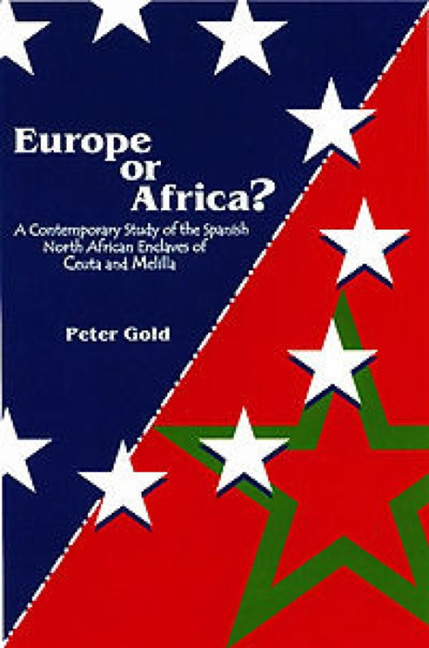Book contents
- Frontmatter
- Dedication
- Contents
- Acknowledgement
- List of figures and tables
- Map
- Introduction
- 1 The impact of the enclaves on Spanish–Moroccan relations
- 2 The enclaves within the Spanish state: the autonomy statutes
- 3 The evolving political landscape in the enclaves
- 4 The 1985 Immigration Law and community relations in the enclaves
- 5 The enclaves: a migration gateway to Europe
- 6 The enclaves: Europe or Africa?
- 7 Gibraltar and the enclaves
- 8 Conclusion: looking to the future
- References
- Index
6 - The enclaves: Europe or Africa?
- Frontmatter
- Dedication
- Contents
- Acknowledgement
- List of figures and tables
- Map
- Introduction
- 1 The impact of the enclaves on Spanish–Moroccan relations
- 2 The enclaves within the Spanish state: the autonomy statutes
- 3 The evolving political landscape in the enclaves
- 4 The 1985 Immigration Law and community relations in the enclaves
- 5 The enclaves: a migration gateway to Europe
- 6 The enclaves: Europe or Africa?
- 7 Gibraltar and the enclaves
- 8 Conclusion: looking to the future
- References
- Index
Summary
The anomalous position of the enclaves as entities which are geographically in Africa but politically and in many other respects part of Europe has from time to time resulted in a degree of ambivalence as to whether they should be treated as part of Europe or as part of Africa. This chapter explores some aspects of this issue which are not dealt with elsewhere in this study.
The economy
Since 1986 Ceuta and Melilla have been part of the European Community/Union, although not part of the customs territory. They have certain preferential arrangements with the EU as a whole, and additional preference arrangements with peninsular Spain, whereby goods originating in Ceuta or Melilla qualify for exemption from duty. They are not subject to the Common Agricultural Policy nor the EU fisheries and trade policies. Under Spanish law the territories have been designated as exempted areas for customs purposes, making them in effect tax-free zones, and there is substantial trading in tax-free goods to non-residents, with thousands of Moroccans entering the enclaves every day to buy goods for resale in nearby Moroccan towns at a premium. They are neither like the French Départements d'Outre Mer (the DOM), which are part of the EU and part of the customs territory, nor like the Térritoires d'Outre Mer (the TOM), which are neither part of the EU nor part of the customs territory. But they are in a similar position to Gibraltar, which is also part of the EU but not part of the customs territory.
Their constitutional relationship with the EU entitles the enclaves to receive financial support for infrastructural development programmes. For example, Spain obtained its first tranche of EU funds as part of the Community Support Framework under Objective 1 in November 1994. It totalled € 3.33 billion over six years, and included projects for Ceuta and Melilla to cover ring roads, the improvement of port facilities, the modernization of telecommunications systems and the construction of health centres. In July 1996 the EU allocated a further € 186 million over three years to support cross-border cooperation between Spain and Morocco. Some of this funding was designed to help the further development of port installations in the enclaves.
- Type
- Chapter
- Information
- Europe or Africa?A Contemporary Study of the Spanish North African Enclaves of Ceuta and Melilla, pp. 151 - 157Publisher: Liverpool University PressPrint publication year: 2000



